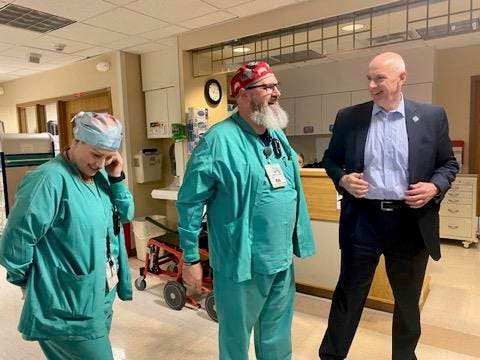CEO Warner Thomas and the talented Sutter Health team
Lara Hazard
Healthcare accounts for 17% of GDP and is not only the engine of our economy, but more importantly, it is at the heart of our well-being. I was interested in finding out what America's best healthcare providers do to stay on top. For all five people I interviewed, including leaders in integrative medicine, acute hospital systems, behavioral health, and pediatric medicine, the answer was one word: culture.
This idea is reinforced by the famous assertion of Peter Drucker, perhaps the greatest business thought leader of the last century, that “culture eats strategy for breakfast.” BTS CEO Jessica Skon, an expert on culture and strategy execution, offered a perspective that underscores this premise. “Companies that treat culture as a driver of strategy achieve their goals faster than companies that treat culture as an afterthought. An organization's culture is created by design or by chance to either drive success or derail it. CEOs who are intentional about evolving their organizational culture make a lasting impact and accelerate strategic direction.”
In this article, we'll share the ideas and unique practices highlighted by CEOs. Companies interviewed include Boston Children's Hospital, Northwell Health, Kaiser Permanente, Sutter Health, and Universal Health Services.
Communication – Foundation
Michael Dowling, CEO of Northwell Health, New York State's largest health care provider with 21 hospitals and approximately 90,000 employees, shares the importance of communication: That's why for the past 20 years, I've met with every new employee in person every week to share our values and mission, and listen to their questions. I also take 40 frontline staff to dinner each week and have breakfast with employees at all levels almost every morning. It's all about sending the message that we're doing great work, that what we're doing matters, and that what we do matters. How CEOs and top leaders interact with their staff makes a big difference. ”
Unique practices bring people together
Northwell also has many unique practices that revitalize our culture while giving back to our community and promoting health. For example, we opened a store that provided clothing to the poor in the area through employee donations. Employee recognition is a big focus for us. Every year, we host a cooking competition called the Chef's Challenge, where gourmet dishes created by hospital chefs are judged by a panel of culinary and health experts. Through our annual Innovation Challenge, Northwell awards more than $1 million to employee-led projects that advance the future of health care. The President's Awards competition recognizes individuals and teams who inspire their colleagues with motivational stories of compassion, resilience, teamwork and innovation. And the Truly Awards recognize physicians who go above and beyond to improve the standard of care for their patients, colleagues, and communities. Mr. Dowling sums up his philosophy: “I spend more time on the people part of the business than anything else because our employees are our greatest asset.”
Leaders set the rhythm of culture.
Warner Thomas has been instrumental in driving Sutter Health's world-class culture for its 57,000 employees across 24 hospitals. Thomas explains the CEO's role in building culture: Setting the culture starts at the top, and everyone has a role to play. To achieve that, establish clear goals and metrics and ensure employees understand the team's priorities and focus areas. Effective leaders set the rhythm for their teams to discuss and advance these priorities. They set a meeting cadence to keep the team informed and in sync. I recommend daily huddles, weekly team meetings, monthly business reviews, quarterly strategy sessions, and annual team retreats. This kind of rhythm helps create clarity by ensuring the team understands the why, how, and what. ”
Difference becomes strength
Kevin B. Churchwell, M.D., president and CEO of Boston Children's Hospital, founded in 1869, consistently ranked as a top pediatric center and operated as an affiliate of Harvard Medical School, is a true culture leader. I'm sharing the communication practices that have helped me unlock. Our employees can lead and connect through employee-led groups (ELGs) and other physician, trainee and research forums, building bridges across cultures and common interests. Although ELGs are not unique to Boston Children's, we are proud of their number and diversity, and they remind us that our differences make us stronger. ”
Learning creates empowerment
Kaiser Permanente created a unique, integrated, value-based care model more than 75 years ago. Dr. Maria Ansari, CEO of Permanente Medical Group, shared the learning culture philosophy and how it works in the Kaiser Permanente model, saying, This approach empowers care teams to deliver superior care, impacting quality, patient experience, and innovation while also improving morale and job satisfaction. ”
The power of connection – the path to excellence
Mark D. Miller, President and CEO of Universal Health Services, is a leader in behavioral health, one of health care's fastest growing and important sectors. Through its subsidiaries, the company operates 333 behavioral health hospitals and 28 medical/surgical hospitals and employs 96,000 people. Mark emphasizes that culture is all about the team and the key to a great culture starts with communication. Once a year, the Corporate Office hosts a Q&A-style town hall for each department.
For example, a recent (and frequently asked) question from employees is the topic of AI. How AI will change the healthcare sector, how it complements/supports back-office operations, and what is the UHS plan to provide appropriate, prudent and relevant services. It's a thing. Thoughtful research and implementation. Employees gain insight into my perspectives on current business topics, leadership priorities, healthcare trends and challenges, government policy issues, and more. I believe this and other systematic communication platforms will lead to an intentional and consistent focus on excellence. ”

